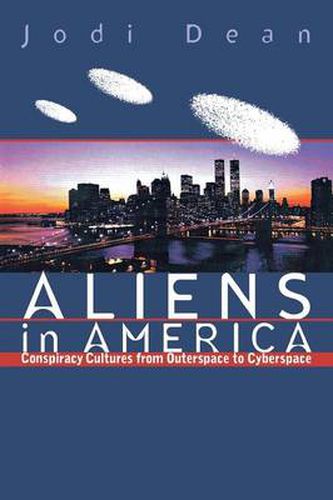Readings Newsletter
Become a Readings Member to make your shopping experience even easier.
Sign in or sign up for free!
You’re not far away from qualifying for FREE standard shipping within Australia
You’ve qualified for FREE standard shipping within Australia
The cart is loading…






Aliens have invaded the United States. No longer confined to science fiction and tabloids, aliens appear in the New York Times , Washington Post and Wall Street Journal , at sweet counters (in chocolate-covered flying saucers and Martian melon-flavoured lollipops) and on Internet web sites. Aliens are at the centre of a faculty battle at Harvard. They have been used to market AT&T, cellular phones, Milky Way chocolate bars, Kodak film, Diet Coke, skateboard accessories and abduction insurance. A Gallup poll reports that 27 percent of Americans believe space aliens have visited Earth. A Time /CNN poll finds 80 percent of its respondents believe the US government is covering up knowledge of the existence of aliens. In a provocative analysis of public culture and popular concerns, Jodi Dean examines how serious UFO-logists and their pop-culture counterparts tap into fears, phobias and conspiracy theories with a deep past and a vivid present in American society. What does the widespread American belief in extraterrestrials say about the public sphere? How common are our assumptions about what is real? Is there any such thing as common sense? Aliens, the author asserts, provide cultural icons through which to access the new conditions of democratic politics at the millennium. Because of the technological complexity of our age, political choices and decisions have become virtually meaningless, practically impossible. How do we judge what is real, believable, trustworthy or authoritative? When the truth is out there, but we can trust no-one, Dean argues, paranoia is indeed the most sensible response.
$9.00 standard shipping within Australia
FREE standard shipping within Australia for orders over $100.00
Express & International shipping calculated at checkout
Aliens have invaded the United States. No longer confined to science fiction and tabloids, aliens appear in the New York Times , Washington Post and Wall Street Journal , at sweet counters (in chocolate-covered flying saucers and Martian melon-flavoured lollipops) and on Internet web sites. Aliens are at the centre of a faculty battle at Harvard. They have been used to market AT&T, cellular phones, Milky Way chocolate bars, Kodak film, Diet Coke, skateboard accessories and abduction insurance. A Gallup poll reports that 27 percent of Americans believe space aliens have visited Earth. A Time /CNN poll finds 80 percent of its respondents believe the US government is covering up knowledge of the existence of aliens. In a provocative analysis of public culture and popular concerns, Jodi Dean examines how serious UFO-logists and their pop-culture counterparts tap into fears, phobias and conspiracy theories with a deep past and a vivid present in American society. What does the widespread American belief in extraterrestrials say about the public sphere? How common are our assumptions about what is real? Is there any such thing as common sense? Aliens, the author asserts, provide cultural icons through which to access the new conditions of democratic politics at the millennium. Because of the technological complexity of our age, political choices and decisions have become virtually meaningless, practically impossible. How do we judge what is real, believable, trustworthy or authoritative? When the truth is out there, but we can trust no-one, Dean argues, paranoia is indeed the most sensible response.